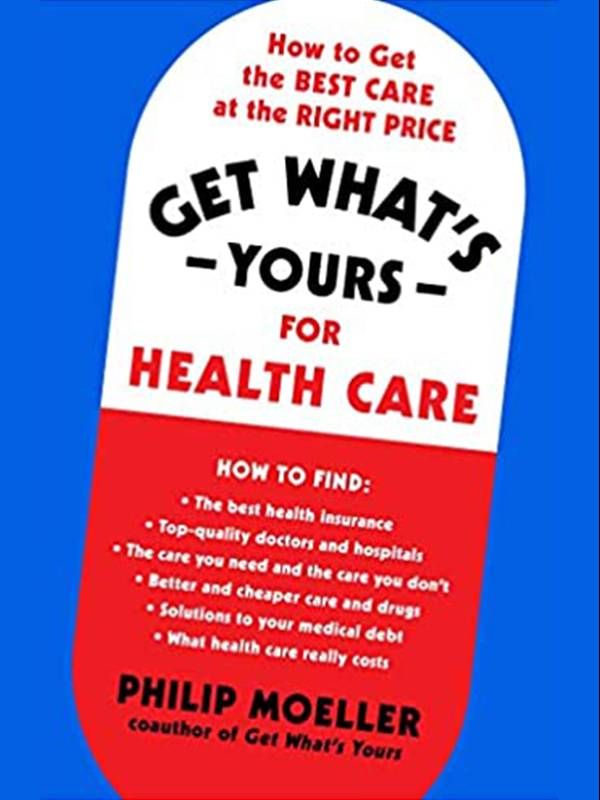How to Get the Best Health Care at the Right Price
Advice from the author of a new book and from the "Friends Talk Money" podcast hosts
Philip Moeller, author of the helpful new book "Get What's Yours for Health Care," says you need to be your own advocate to save on health care expenses. "If people act like sheep, they're going to get fleeced," he told me.

In the new episode of the "Friends Talk Money" podcast I co-host with Terry Savage and Pam Krueger (available wherever you get your podcasts and also at the end of this article), we talked with Moeller and shared our best advice on keeping your health costs down without sacrificing on quality.
A typical telehealth doctor's visit costs about $80, while an office visit runs $146, on average.
"The average couple will need $295,000 to cover medical expenses in retirement. And that excludes expensive things like long-term care, co-payments, co-insurance and deductibles for doctor and hospital visits," said Savage, a nationally syndicated personal finance columnist and author of "The Savage Truth on Money." She was citing the unsettling 2020 Fidelity Retiree Health Care Cost Estimate.
Moeller on Health Costs and Health Quality
Moeller — who writes the "Ask Phil" column on PBS NewsHour's Making Sense website — said that in researching his book, he found there was no correlation between the cost of health care and the quality of health care. In fact, he said, often the best health care is less expensive.
Moeller, my "Friends Talk Money" podcast hosts and I are all fans of using technology to help keep your health costs down.
Two money-saving apps Moeller suggests checking out: Healthcare Bluebook (available in Apple's App Store and on Google Play) and Rally, available through health insurers such as Aetna, Cigna and United Healthcare.
Saving Money Through Telehealth
Of course, telemedicine has been a boon for many of us during the pandemic when we sometimes haven't been able to see physicians in person. It can also save you money.

Krueger cited a HealthAffairs study that found a typical telehealth doctor's visit costs about $80, while an office visit runs $146, on average.
"I have a family member who saw his dermatologist using one of these [telemedicine] apps and he was thrilled with the visit because he could show him the spots on his head," Krueger noted. "The doctor said: 'You know what? Those are looking like they're healing up really nicely.'"
Moeller is a big fan of talking to your health insurer before you need your care to help save money. That way, you'll know what would be covered and what wouldn't if you need a medical procedure. He believes many of us overpay for health care costs because we don't do our homework.
Savage concurred. "You have to know what's covered. You have to know what your responsibility is," she said.
Your Health Care 'Posse'
Moeller also recommends having a "health care posse." That means choosing one or more people who will be your advocates to help ensure you get the right care for the right price. Your posse could include a spouse or partner or friend, he said, or a doctor you know and trust. You should bring a member of your posse with you to doctor's appointments and hospital stays to ask questions for you and keep you apprised of your health situation.
Krueger likes this idea. "I'm a huge fan of advocates," she said. Just be sure the person or people you choose have the time to assist you, she added.
To lower your prescription drug costs, Moeller said, use a discount pricing service like GoodRx. It can check prices of generics at over 7,000 pharmacies so you can see how they compare and how to save on medications.
Also, Moeller said, ask your pharmacist what your prescription would cost if you didn't use your health insurance to pay for it. Sometimes, medications cost less outside of insurance.
Another way to keep costs down, if you have a high-deductible health insurance plan: a Health Savings Account.
Traditional Medicare or Medicare Advantage?
One big health care cost question for people 65 and older: Enroll in Traditional Medicare or get a Medicare Advantage plan from a private insurer instead?

Moeller believes Medicare Advantage is where things are heading, but for now, he uses Traditional Medicare (plus a Medicare supplemental policy) because Traditional Medicare doesn't limit his choice of doctors or hospitals the way Medicare Advantage does.
Savage's view: it depends on how healthy you are. If you have good health and don't expect to need to visit many doctors or hospitals and have a lot of co-pays, she said, you might save with a Medicare Advantage policy. But she has Traditional Medicare and a supplemental policy, like Moeller, just to be safe.
Another way to keep your health costs down, if you have a high-deductible health insurance plan: a Health Savings Account or HSA. It lets you save for health expenses and is triple tax-free: The money goes in pre-tax, the money the account earns grows tax-deferred and withdrawals are tax-free. (You can't contribute to an HSA once you're in Medicare.)
"Think of this as an IRA account for your health care spending," said Krueger. "It's a no-brainer."


